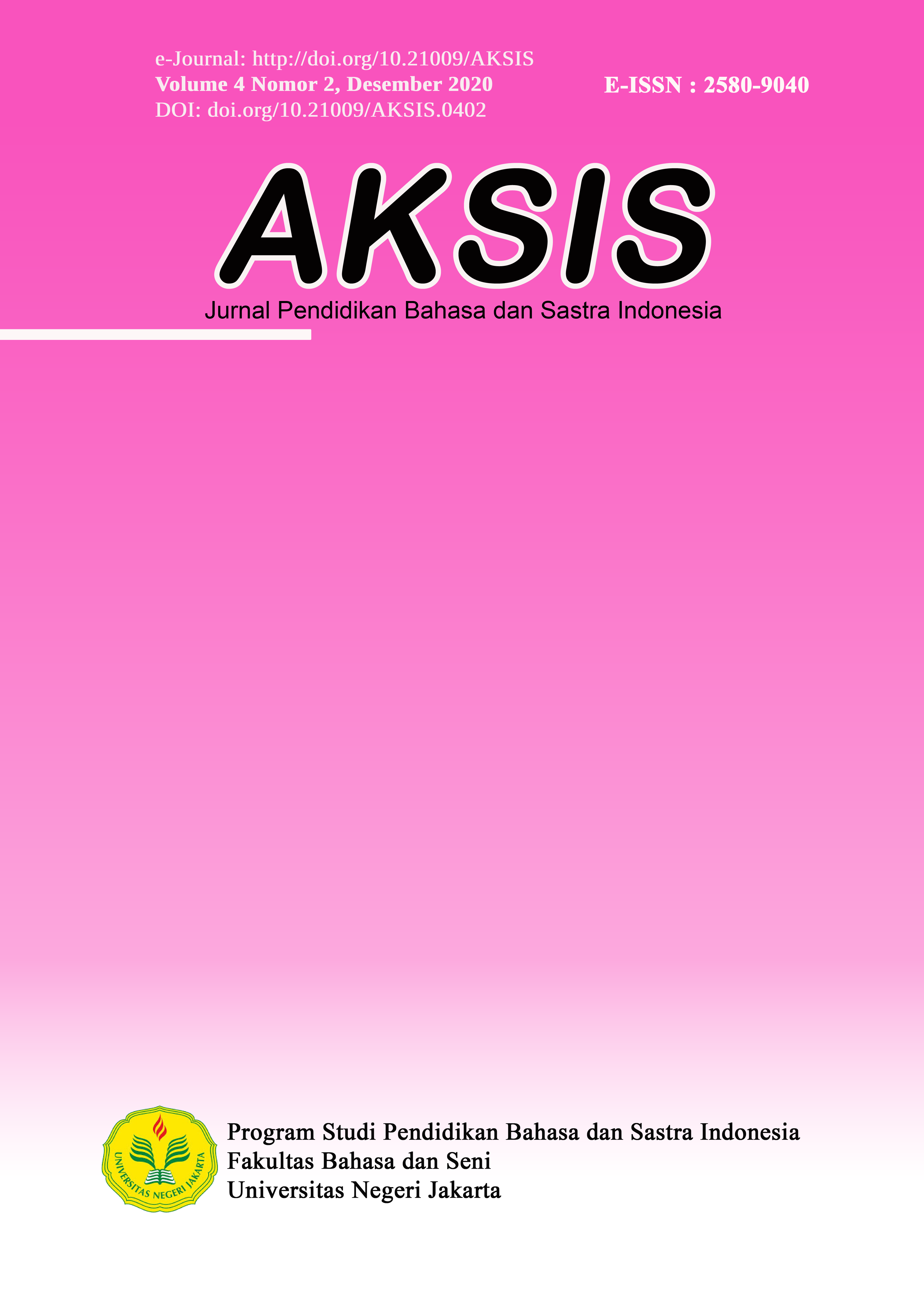Portrait of Indonesian Workers Life in Saudi Arabia in the Novel Kedai 1001 Mimpi by Valiant Budi
DOI:
https://doi.org/10.21009/AKSIS.040213Keywords:
portrait of humanity, Indonesian workers, Saudi ArabiaAbstract
A grim portrait of life is often shown by migrant workers who work in Saudi Arabia through novel Kedai 1001 Mimpi by Valiant Budi, researcher tries to peel the grim portrait of migrant workers in Saudi Arabia. This research, using qualitative descriptive method and literature sociology approach, seeks to explore the portrait of humanity accepted by Indonesian labor migrants working in Saudi Arabia. The results of this study show a portrait of humanity experienced by female and male migrant workers. The portrait of life that happens to women in the novel Kedai 1001 Mimpi by Valian Budi is sexual harassment, physical violence, accusation, lack of protection. The portrait of humanity portrayed in male migrant workers is harassment, dissension, defamation, and unclear employment contracts. This research has significance in the humanitarian and social fields that there are many grim portraits of living witnesses who have worked as migrant workers in Saudi Arabia so that the government needs to find the right solution so that the forms of injustice received by migrant workers in Saudi Arabia do not recur.
References
Budi, Valiant. (2011). Kedai 1001 Mimpi. Jakarta. GagasMedia.
Damono, Sapardi Djoko. (1979). Sosiologi Sastra Sebuah Pengantar Singkat. Jakarta: Pusat Pembinaan dan Pengembangan Bahasa Depdikbud.
Koesrianti. Perlindungan Hukum Pekerja Migran Penata Laksana Rumah Tangga (PLRT) di Luar Negeri Oleh Negara Ditinjau Dari Konsep Tanggung Jawab Negara. Yustisia, Vol.4 No. 2 Mei-Agustus 201.
Nevlanti. (2010). Analisis Trend dan Dampak Pengiriman TKI: Kasus Dua Desa Di Lombok Timur, Nusa Tenggara Barat. Jurnal Kependudukan Indonesia Vol. V, No. 1, 2010.
Puspitasari, Rizka. (2016). Analisis Penyebab Praktik Kerja Paksa Di Arab Saudi: Fenomena Kerja Paksa Terhadap Tki Informal (2011-2014). Journal of International Relations, Volume 2, Nomor 3, Tahun 2016, hal. 210-219.
Raharto, Aswatini. (2017). Pengambilan Keputusan Tenaga Kerja Indonesia (TKI) Perempuan Untuk Bekerja di Luar Negeri:Kasus Kabupaten Cilacap. Jurnal Kependudukan Indonesia, Vol. 12 No. 1 Juni 2017, p. 39-54.
Sidik dan Elvianti. (2018). The Consignment of Indonesian Migrant Workers in Saudi Arabia and Its Resilience: Examining the Impacts of Indonesia’s Moratorium Policy (2011-2015). Andalas Journal of International Studies| Vol VII No 1 May 2018.
Sugiono, dkk. (2017). Interpretasi Dampak Keuangan Keluarga Tenaga Kerja Wanita (Studi Fenomenologi TKW Pamekasan yang Berimigrasi ke Saudi Arabia dan Malaysia) AKUNTABE, Volume 14, No. 2 2017.
Susilo, Singgih. (2016). Beberapa Faktor Yang Menentukan TKI dalam Memilih Negara Tujuan Sebagai Tempat Bekerja, Studi Di Desa Aryojeding Kabupaten Tulungagung. Jurnal Pendidikan Geografi, th. 21, no 2, Juni 2016.
Suhita, S., & Purwahida, R. (2018). Apresiasi Sastra Indonesia dan Pembelajarannya. Bandung: Remaja Rosdakarya.
Syarifuddin. (2018). Kajian Struktural dan Sosiologi Sastra dalam Novel Seputih hati yang Tercabik. Jurnal Kata, Vol 2. No 2, 2018.
Wiyatmi. (2013). Sosiologi sastra. Yogyakarta. Kanwa Publisher.






